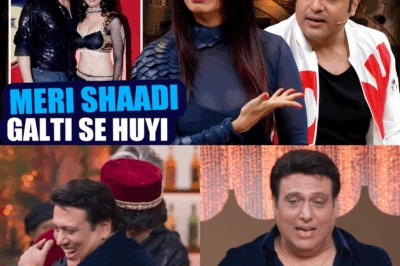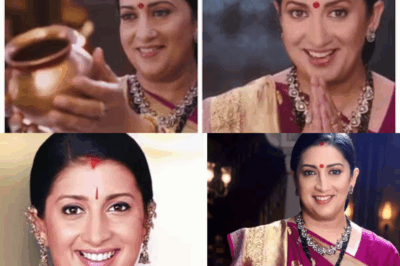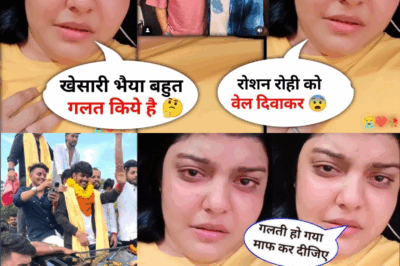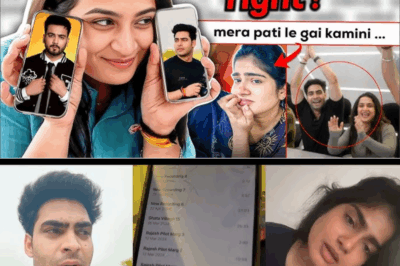A Shocking Tale of Betrayal, Revenge, and Forced Love: The Gonda Love Triangle That Stunned India
In the heartland of Uttar Pradesh, India, a shocking saga unfolded in the quiet district of Gonda—a story so bizarre and emotionally charged that it gripped the nation, exposing the dark underbelly of rural relationships, honor, and justice. This is not just a love triangle; it is a chilling account of suspicion, betrayal, public humiliation, and a forced marriage, all played out under the harsh gaze of an entire village and the unblinking eye of a camera.

The Players: A Family Torn Apart
At the center of this drama is Harishchandra, a 40-year-old man who, fifteen years ago, married a woman named Karishma. Together, they built a life, raising a son and a daughter—an ordinary family, or so it seemed. Their son is 11, their daughter around 8 or 9. For years, their life mirrored that of countless other rural Indian families: simple, routine, and uneventful.
But beneath the surface, tension simmered. Eight or nine months ago, Harishchandra’s world was shaken when he began to suspect that his wife was having an affair with a man from a neighboring village—a man named Shivraj Chauhan. The mere suspicion of infidelity is enough to ignite chaos in many Indian households, but what followed in Gonda would go far beyond the ordinary.
Seeds of Doubt: The First Confrontation
The first confrontation did not lead to violence or a breakup but to the police station. Harishchandra, tormented by suspicion, brought his grievances to the authorities. The police, in typical fashion, mediated a reconciliation. Karishma was sent back to her husband, and for a while, peace returned. But the seeds of doubt had been sown, and they would soon bear poisonous fruit.
The Plot Thickens: Illness and Opportunity
Tragedy struck when Harishchandra underwent an operation, leaving him unable to walk. Immobilized and vulnerable, he became more dependent on Karishma. But according to his later claims, this vulnerability was exploited. He accused his wife of drugging their son to keep him asleep for hours, while she allegedly slipped away to meet her lover, Shivraj Chauhan. The village buzzed with rumors, but Harishchandra had no proof—until June 19th, the day everything changed.
The Public Spectacle: Rituals of Shame and Liberation
On that fateful Thursday, Harishchandra claims to have caught Karishma and Shivraj “red-handed.” What followed was nothing short of a public spectacle—a medieval ritual of shame and forced liberation, broadcast for all to see.
He dragged his wife to a temple 500 meters from their home, summoned the village elders, and called a priest. In front of a crowd, he forced Karishma to sit under a hand pump. He poured water over her head, washing away the vermillion (sindoor) from her hair—the sacred symbol of marriage for Hindu women. Karishma, visibly distressed, tried to resist, pleading for him to stop, but Harishchandra was relentless. He erased the last symbolic trace of their union, declaring her no longer his wife.
But the drama didn’t end there. As the villagers watched, Shivraj Chauhan stepped forward. With the priest’s blessing, he filled Karishma’s hairline with fresh sindoor and exchanged garlands with her—a ritual signifying their marriage. The woman who had just been publicly humiliated by her husband was now, in the blink of an eye, married to another man.
The Aftermath: Conflicting Stories and Broken Trust
The aftermath was chaotic. Harishchandra, speaking to the camera, insisted that he had set his wife free, that he wanted nothing more to do with her, and that she should return his jewelry and their daughter. He accused Karishma of trying to poison him, of plotting his murder, and said he orchestrated the marriage to protect himself from future harm.
Karishma, on the other hand, denied everything. She claimed she had no relationship with Shivraj Chauhan, that she had gone to the police station because of a fight with her husband, and that everything that followed was forced upon her. “I don’t know why this is happening. I don’t want this,” she told the camera, her voice trembling with fear and anger. She insisted that her only issue was with her husband, and that she had no prior connection with Shivraj.

Shivraj Chauhan, now thrust into the role of Karishma’s new husband, seemed equally bewildered. He admitted that they had spoken on the phone but denied any romantic involvement. “We had only conversations, nothing else,” he said, insisting that he was satisfied with the marriage but that it had all happened under extraordinary circumstances.
The Children: Innocent Victims
Lost in this storm of accusations and public rituals were the two children. Harishchandra demanded both children be returned to him, while Karishma insisted that her daughter would stay with her. The fate of the children hung in the balance, their lives upended by the decisions and suspicions of the adults around them.
The Lawless Land: Justice by Panchayat
What is perhaps most disturbing about this tale is the complete absence of legal oversight. The entire episode—from the public humiliation to the forced marriage—was carried out by the village panchayat (council) and the priest, with no police intervention. The local police, when contacted, revealed that no formal complaint had been filed. “If a written complaint is made, we will take action,” they said, as if the entire spectacle was just another day in rural India.
This is not just a story of personal betrayal; it is a chilling reminder of how, in many parts of India, traditional forms of justice still hold sway, often with devastating consequences for women.
The Social Media Storm: Outrage and Sympathy
As the video of the incident went viral, social media exploded with outrage. Many condemned Harishchandra’s actions as barbaric and patriarchal, a gross violation of Karishma’s rights and dignity. Others saw him as a wronged husband, pushed to the brink by betrayal.
Some viewers were moved to tears by Karishma’s on-camera pleas, her desperate attempts to reclaim her agency in a world that seemed determined to strip it away. Others were angered by the complicity of the villagers, who not only allowed the spectacle to unfold but participated in it, turning a private tragedy into a public circus.
The Deeper Issues: Gender, Power, and Honor
At its core, this story is about more than a love triangle. It is about power—the power of men over women, of tradition over law, and of the collective over the individual. It is about the ways in which women’s bodies and choices are policed, punished, and paraded for public consumption.
Harishchandra’s actions were not just those of a jealous husband; they were those of a man seeking to reclaim his honor in the eyes of his community. By publicly erasing the sindoor and orchestrating his wife’s remarriage, he sought to erase the stain of her alleged infidelity and reassert his control—not just over Karishma, but over the narrative itself.
Karishma’s resistance, her refusal to accept the forced marriage, is a quiet act of defiance—a refusal to be reduced to a pawn in a game of male egos and village politics.
The Legal Void: Where Is Justice?

This incident raises urgent questions about the state of justice in rural India. How could such a public violation of a woman’s rights go unpunished? Why did the police not intervene, even after the video went viral? What recourse does Karishma have, if any, in a system that seems stacked against her at every turn?
The answer, sadly, is that for many women like Karishma, justice is elusive. The law exists on paper, but in practice, tradition and patriarchy often hold more sway. Until this changes, stories like Karishma’s will continue to haunt the Indian countryside.
A Call for Change
The Gonda love triangle is a story that shocks, angers, and saddens in equal measure. It is a story of love gone wrong, of trust betrayed, of public shaming and forced unions. But above all, it is a story that demands our attention—a call to action for a society that still allows such injustices to occur in the name of honor and tradition.
As the dust settles in Gonda, one can only hope that Karishma, and countless women like her, will one day find the justice and dignity they deserve. Until then, their stories must be told, their voices heard, and their rights defended—no matter how uncomfortable or inconvenient that may be.
What do you think about this shocking case? Should traditional justice be allowed to override the law? Share your thoughts in the comments.
News
Salman Khan’s Playful Reaction: When Vicky Kaushal Casually Proposed to Katrina Kaif
Salman Khan’s Playful Reaction: When Vicky Kaushal Casually Proposed to Katrina Kaif Bollywood has always been a treasure trove of…
Krushna Abhishek Opens Up About ‘Accidental’ Marriage, Family Ties, and Govinda Rift on The Kapil Sharma Show
Krushna Abhishek Opens Up About ‘Accidental’ Marriage, Family Ties, and Govinda Rift on The Kapil Sharma Show Renowned comedian and…
Smriti Irani’s Return as Tulsi in “Kyunki Saas Bhi Kabhi Bahu Thi 2” Sends Social Media Into a Frenzy
Smriti Irani’s Return as Tulsi in “Kyunki Saas Bhi Kabhi Bahu Thi 2” Sends Social Media Into a Frenzy After…
Nora Fatehi Spotted in Tears at Airport; Bodyguard Labels Fan ‘Chhapri’ in Viral Incident
Nora Fatehi Spotted in Tears at Airport; Bodyguard Labels Fan ‘Chhapri’ in Viral Incident Bollywood sensation Nora Fatehi, known for…
What Did Kiran Singh Say to Khesari Lal Yadav About Roshan Rohi’s Bail? Bhojpuri Industry Faces Backlash
What Did Kiran Singh Say to Khesari Lal Yadav About Roshan Rohi’s Bail? Bhojpuri Industry Faces Backlash The Bhojpuri entertainment…
Kataria Shares Honest Take on Ajju0008 and Pratibha’s Divorce Drama: Calls for Privacy and Maturity
Kataria Shares Honest Take on Ajju0008 and Pratibha’s Divorce Drama: Calls for Privacy and Maturity The Indian influencer and gaming…
End of content
No more pages to load












